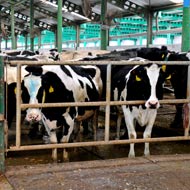Defra earmarks £65m for animal disease

The £65m spend will fund state-of-the-art labs and an upgrade for the Weybridge facilities.
Defra has pledged to invest around £65 million in laboratory improvements to boost the UK's resilience to animal disease.
The news was announced by secretary of state Liz Truss during a speech at the Oxford Farming Conference.
This investment will, she said, "bring us state-of-the-art laboratories and fund the upgrade of our bio-containment facilities at Weybridge, securing our ability to fight diseases like swine fever and avian flu".
Welcoming the news, BVA president Sean Wensley said: "It is encouraging to see the development of state of the art diagnostic facilities and we look forward to hearing more detail about how Surveillance 2014 will work in practice.
"In particular, we need further detail on how Defra will meet the pledge made at last year’s Conference to protect the number of vets working on the ground in order to provide the vital first line of surveillance."
Ms Truss also reiterated her commitment to tackling bovine TB, which includes her wish to extend the controversial badger cull to new areas this year.
"Thanks to the efforts and dedication of local farmers, all three areas - Somerset, Gloucestershire and Dorset - hit their target in 2015. The chief veterinary officer is clear this policy need to be followed over a wider area to secure full disease control benefits.
"That's why I announced, in line with his advice, I was to see culling in more areas this year.
"New cases of TB are levelling off, but we still have the highest rate in Europe. I will do whatever it takes to get rid of this terrible disease."



 HMRC has invited feedback to its communications regarding the employment status of locum vets and vet nurses.
HMRC has invited feedback to its communications regarding the employment status of locum vets and vet nurses.